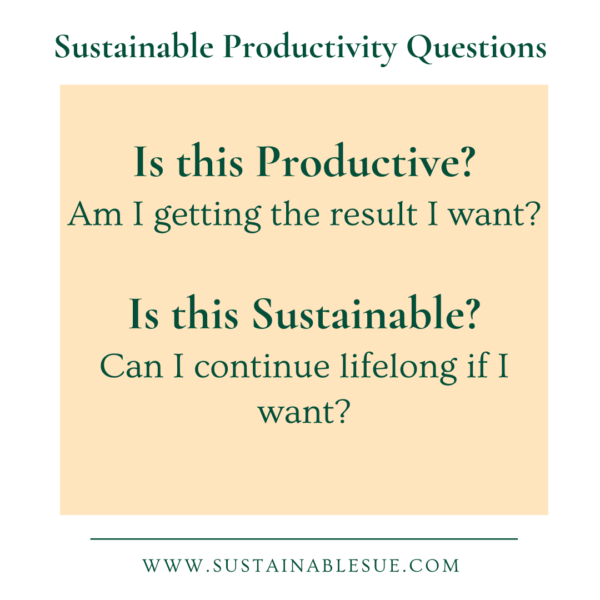Managing expectations is a topic I can’t stop thinking about or talking about since we recorded episode 41 of the Conscious Contact podcast a few weeks ago. I had a few more thoughts about it after recording that I wanted to share here. You can listen to the episode at this link.
The reason that managing expectations is so important is that unvoiced expectations are premeditated resentments. This leads to anger and all sorts of damage to relationships. Important in the Sustainable Sue framework – unvoiced expectations do not meet the criteria of Sustainable Productivity.
Is this Productive – are you getting the result you want?
Is this Sustainable – can you maintain this lifelong if you choose?

Let’s look at managing expectations with ourselves and each other a little closer.
Internal Expectations
These are the expectations we have of ourselves. This could appear in unlimited ways depending on where we are in life and how spiritually fit we are that day. Here is a sneak peek into some of my unrealistic internal expectations.
- I can still play full court 5 on 5 basketball.
- I should be able to “do it all”.
- A good mother would have her children at the extended family Thanksgiving.
- If I was a better project manager I could get people to complete their tasks on time.
- The pants will fit.
- Real authors would have finished the book proposal by now.
- Adult women know how to put an outfit together / put on make up / do their hair (ponytails don’t count).
You can see my brain is a busy place. Not necessarily a friendly place. The origins of these expectations is a topic for another day because today we are talking about managing expectations. What to do when these internal expectations pop up.
While I am not an expert by any stretch, I would like to share what sometimes works for me – it is a work in progress for sure. I call this real me vs ideal me.
Real Me vs. Ideal Me
Here is a simple tool that I use when I recognize an internal expectation is rearing its head. I simply ask myself which Sue would this apply to – Real Me or Ideal Me. While it is good to have a self to strive for, when it becomes inflated into something that is unrealistic, it can become detrimental and toxic to your mental health.
“Start where you are. Use what you have. Do what you can.”
Arthur Ashe
A way to consider this that is more Sustainably Productive is to make small adjustments to get where you want to be instead of expecting you to be there now. An example might provide some clarity here. Luckily we have a long list of unrealistic internal expectations already drafted.
Ideal me would already have a completed book proposal. Welp, I don’t. If I just sit in this “failure” and grieve the missing book proposal that still gets approximately zero words down. That unrealistic internal expectation of being “ideal” is not working and is not sustainable. This is where I sat for about a decade. It is really sucky.
Then I started to make small, sustainable adjustments to write these weekly messages, then started time blocking an hour each week to focus solely on book proposal writing. That is not always a pretty hour. Sometimes each word is hard earned. But the commitment is to dedicate the hour to that project. I don’t have to write, but I can’t do anything else. So I end up writing.
This can apply to every component to Sustainable Productivity.
- Ideal me would have a clutter free house.
- Adjustment: Real me spends 15 minutes every Saturday and Sunday morning sorting a purging something (a drawer, a shelf, a pile on the counter)
- Ideal me would stay off social media.
- Adjustment: Real me sets a timer to read a book for 10 minutes, then to scroll social media for for 10 minutes. You get the best of both and maybe you start to shift the balance away from social media. Or not!
For me managing internal expectations comes easier than managing external expectations. It might be the fact I am an Upholder (see Gretchen Rubin’s 4 Tendencies Framework). But I don’t live the life of a hermit (yet) so I am learning to manage external expectations.
I will share a little more about that next time in Part 2 of Managing Expectations!
Leave A Comment